New Research Documents Quality-of-Life Burden of Hyperhidrosis
Yes. It can be very hard to live with excessive sweating. You knew that. We knew that. But there’s new research documenting the extensive burden hyperhidrosis puts on its sufferers.
The results of a recent study show where important education and advocacy work still needs to be done but that there’s hope, too, because people living with hyperhidrosis are not alone in their difficult experiences. The impact of hyperhidrosis on patients' daily life and quality of life: a qualitative investigation was published in the peer-reviewed journal Health and Quality of Life Impacts. To conduct the study, scientists interviewed and surveyed 71 people (mostly in the United Kingdom) who self-identify as having primary hyperhidrosis.
Interestingly, the researchers found that the burden of hyperhidrosis was similar no matter where on the body participants experienced excessive sweating. And, in general, their findings confirm that hyperhidrosis affects many (arguably almost all) aspects of life and can be very challenging to deal with.
For example:
- Negative emotions
69% of study participants said they experience emotional ramifications from hyperhidrosis. Most participants reported being constantly worried about noticeable sweating. Some also said they experience sadness, anger, and hopelessness.
- Self-image
The majority of respondents reported having low self-esteem and self-confidence as a result of hyperhidrosis. One participant said, “It massively eats away at my self-confidence, it makes me feel awful...”
- Restricted life and loss of control
50% of the people with hyperhidrosis in this study indicated that their lives are restricted by excessive sweating. Some talked of hyperhidrosis “taking over.” One individual described the experience of living with hyperhidrosis as “being trapped.”
- Work or school tasks
63% of participants said that their sweating interferes with their performance at work or school. The majority regarded this as the most important impact of the condition.
- Career
33% reported choosing careers to accommodate their sweating. One participant declined the opportunity to become a policeman “settling for a boring office job” instead.
- Social life
75% of those in the study said they find it difficult to be in public view. 57% reported difficulties interacting with others. Common situations such as being in a shared office or shared classroom, going to a party, eating at a restaurant, using public transportation, or sitting in a movie theater were reported as challenging. Participants said they often avoid such situations.
- Physical contact
Most participants said they are uncomfortable being physically close to others because they are afraid of people’s reactions to their sweating. As a result, they avoid touching, holding or shaking hands, sitting next to others, standing in a line, and dancing. Some participants said they are uncomfortable with any physical affection. According to one study member, “I am unable to touch my husband, daughters and grandchildren without first thinking about how to do it without them actually having contact with my skin.” Study participants also reported avoiding going out and being in public and, as a result, an inability to nurture important relationships.
- Physical discomfort and skin problems
40% of study participants said hyperhidrosis is associated with some level of physical discomfort. Individuals said they experience discomfort in relation to “being in wet clothes day in, day out,” “having wet feet,” and “sweat dripping into the eyes.” 17% of patients reported other skin problems that they attribute to constant dampness due to hyperhidrosis. The most common were sore and cracked skin.
- Lifestyle
61% of patients said that sweating influences their choice of clothing, particularly material, color, and design. Respondents also reported that they cannot enjoy certain recreational activities and are unable to travel to warm-weather destinations.
- Hobbies
41% of patients said hobbies are affected by hyperhidrosis including physical as well as non-physical activities such as cycling, exercising in the gym, playing musical instruments, doing yoga, reading books or newspapers, and crocheting/knitting. One patient said, “I don’t like exercising on the street or anything like that… people tend to look at me if am really sweaty and that makes me really nervous”.
- Everyday activities
The majority of respondents said hyperhidrosis interferes with general tasks like holding objects, turning door handles, opening jars, working with tools, driving, shopping, and manual work. 33% said they have problems with household chores such as cleaning, cooking, ironing, and caring for young children.
- Touch technologies
20% of the respondents reported problems using touch technologies including computer keyboards, computer mice, mobile phones, and touch screens.
- Personal hygiene and special chores
17% percent of the individuals mentioned doing extra chores in order to stay “clean,” such as taking a shower several times a day, changing clothes or shoes often, and using strong antiperspirants.
- Unmet healthcare needs
Most participants said they are not satisfied with the way their condition is being managed in a healthcare setting. In particular, they said they are concerned about poor relationships with physicians, difficulty of obtaining an accurate diagnosis, and lack of (or limited access to) effective treatments as well as negative side effects of treatments. The experience of getting diagnosed was also described as “humiliating” and “belittling.” Participants reported that their sweating problems are not taken seriously by clinicians and said they are frustrated by limited coverage for treatments like Botox and iontophoresis and lack of other effective therapies.
- Lack of information
Nearly a third of the study participants indicated that they find currently available information on hyperhidrosis inadequate. In particular, participants would like to know what causes hyperhidrosis and what new treatments are in development. Patients also expressed worries about the level of knowledge among healthcare practitioners about the condition. Others said they are concerned about lack of public awareness and said they feel this is why there’s not much sympathy for hyperhidrosis. Most of those in the study said they are unaware of the risks of compensatory sweating associated with ETS surgery.
The above results show that the impacts of hyperhidrosis on individuals’ lives are far-reaching -- affecting everything from daily household chores and parenting to self-esteem and personal relationships.
And, we see many areas of need including:
- Expanded access to treatment
- Greater patient, healthcare provider, and public education regarding excessive sweating, it’s consequences, and care
- Increased support for patients to help them deal with the psychological ramifications of hyperhidrosis including access to services such as counseling
From the research results we’ve discussed here, it’s clear that more outreach is needed -- but we can’t do it without you!
Spread the word about hyperhidrosis and share SweatHelp.org and this blog widely to help us build greater awareness and concern for the needs of those living with excessive sweating and its myriad detrimental effects. Please also consider making a tax-deductible donation to help us continue our advocacy work.
Remember, the International Hypehidrosis Society speaks up for people with hyperhidrosis around the world and we provide comprehensive information about current hyperhidrosis treatments, new research results, and clinical trials.
We also provide up-to-date training for healthcare providers as well as advocacy and educational opportunities for patients, clinicians, researchers, and the general public.
Watch this blog for important information about our patient-focused hyperhidrosis treatment development meeting this fall in Washington, DC!
You can attend online and be heard.


